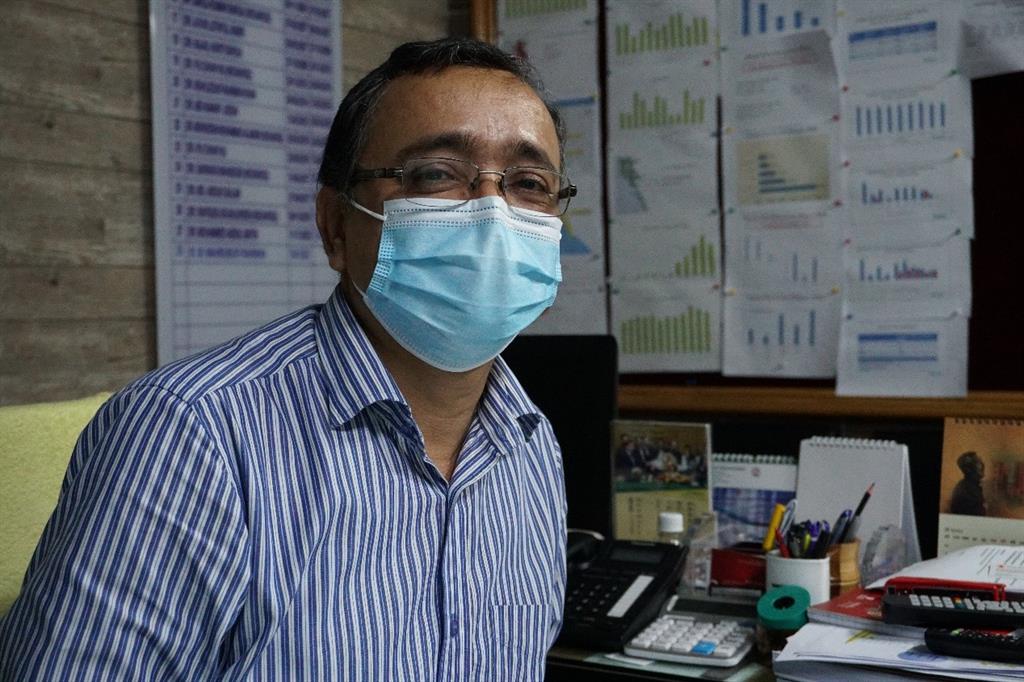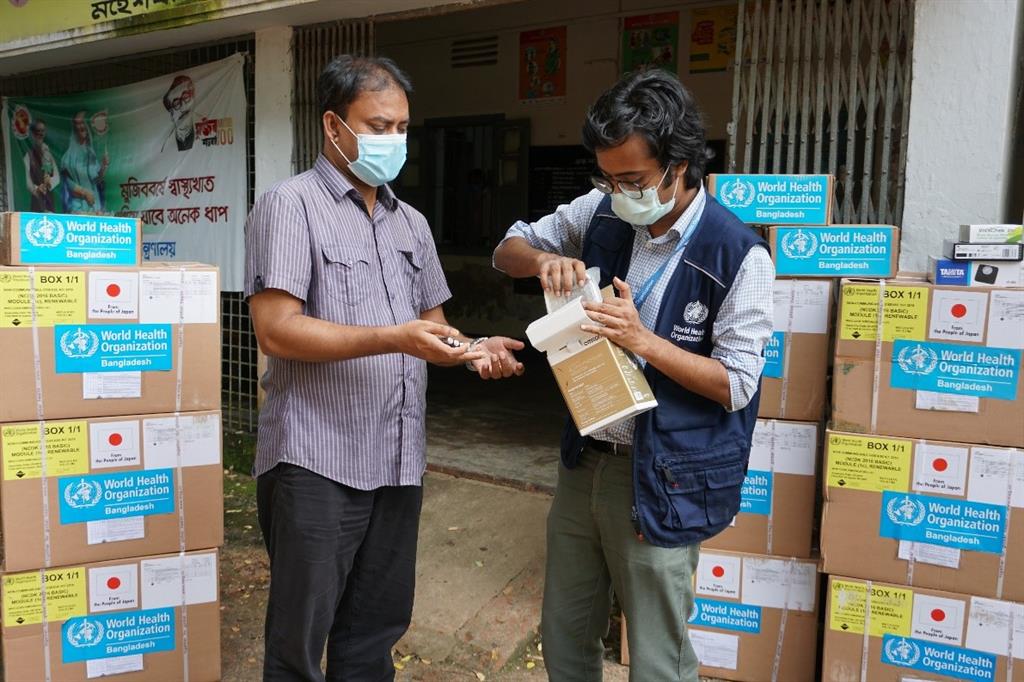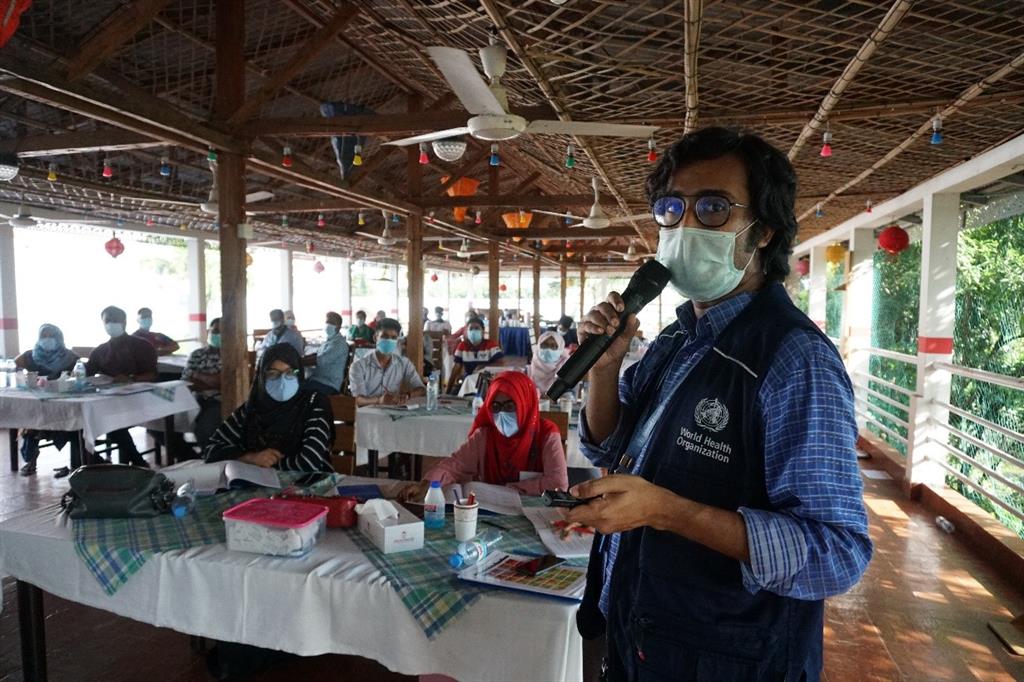The fight against COVID-19 has severely disrupted essential health services such as prevention and treatment for cancer, diabetes, hypertension and other noncommunicable diseases (NCDs) which kill more than 40 million people every year.
In Cox’s Bazar, COVID-19 and NCDs are affecting the most at-risk populations of becoming severely ill or dying from the coronavirus, but also the poorest and most vulnerable including the Rohingya refugees. On World Diabetes Day, WHO showcases Cox’s Bazar encouraging leadership to beat NCDs as part of the COVID-19 emergency response. An important decision that has prompt a movement to beat NCDs.

Cox’s Bazar Civil Surgeon, Dr Md. Mahbubur Rahman, was diagnosed with Diabetes 20 years ago. His condition has inspired him to take the leadership and pave the way to beating NCDs in Cox’s Bazar. WHO Bangladesh/Tatiana Almeida
“Living with Diabetes for 20 years now, I am personally taking this situation very seriously”, says Cox’s Bazar Civil Surgeon, Dr Md. Mahbubur Rahman. The coronavirus pandemic has reminded us all that now more than ever we need to strengthen prevention and control programs for noncommunicable diseases. For that reason, I have called our health partners in Cox’s Bazar to prioritize NCDs so that together we can prevent many COVID-19 deaths in the host and refugee populations”, adds the Civil Surgeon.
“WHO is supporting the Civil Surgeon Office leading NCD care coordination through engaging government partners and national and international stakeholders, while promoting national protocols on high blood pressure and diabetes to address cardiovascular risks. Since the onset of the pandemic, we understood that COVID-19 had created the momentum to strengthen health services with the necessary equipment to prevent, diagnose and continue treating people living with NCDs”, says WHO Head of Sub-Office, Dr Kai von Harbou.
Currently, 94% of the Primary Health Care Facilities in Cox’s Bazar, including in the refugee camps, can manage diabetes, cardiovascular diseases and chronic respiratory diseases. WHO has provided essential NCD supplies to health care facilities in Cox’s Bazar, including NCD Kits with medicines, insulin, stethoscope, digital blood pressure machine, glucometer with strips, weight scale and urine strips to 25 health partners, 5 sub-district level upazila health complexes, 80 community clinics and 9 union level health facilities across 5 upazilas of Cox’s Bazar district.
“At Moheshkhali, NCD patients are increasing day by day and we have only a few medicines for diabetes and hypertension left. Since this is the only Upazila on the island, I am happy to receive these much needed NCD kits today”, says Dr Md. Mahfuzul Haque, Upazila Health and Family Planning Officer, Moheshkhali, Cox’s Bazar.

As Moheshkhali island is one of the most remote areas in Cox’s Bazar District, the upazila health complex is the reference health facility for NCD prevention and treatment. WHO Bangladesh/Tatiana Almeida
As part of WHO’s efforts to stop the COVID-19 pandemic and prepare for the future, to date 281 healthcare workers from 63 health facilities in Cox’s Bazar district have been trained on Package of Essential Interventions of noncommunicable diseases (PEN).
“The training package has been developed by WHO Bangladesh, adapting from the ‘Package of Essential Noncommunicable (PEN) disease and healthy lifestyle interventions, training modules for primary health care workers’. WHO PEN is designed to be delivered by primary health care workers in low-resource settings through a prioritized set of cost-effective lifestyle and pharmacological interventions focusing on task shifting and team-based approach to promote patient centered NCD care. Additionally, WHO is supporting the capacity building of community outreach workers on NCD risk factors as well as supply of essential NCD commodities with gap-filling purpose. We are also conducting supportive supervision visits to strengthen NCD surveillance and monitoring in the Cox’s Bazar district”, explains WHO Noncommunicable Diseases Officer, Dr Raisul Islam.

At WHO, Dr Raisul Islam, embodies the organization’s commitment to fight NCDs. To mention a few, he provides trainings to health care workers, distributes NCD kits and conducts supportive supervision visits. WHO Bangladesh/Tatiana Almeida

Among the WHO PEN training participants in September, Sarmin Nahar stood out as a Midwife concerned with the impact of NCDs on pregnant women. WHO Bangladesh/Tatiana Almeida
“In my work as a midwife, I have encountered many pregnant women with diabetes and hypertension. I usually refer such patients to the Ukhiya upazila health complex but after this training I will know how to educate my patients on prevention of noncommunicable diseases”, tells Sarmin Nahar from Ukhiya Thana Dispensary.
Embedded in the spirit of beating NCDs in Cox’s Bazar, after the training the participants went for a walk at the world’s longest beach carrying the messages they had just committed to. A commitment for life, they say, and the most serious promise to their patients, especially those most at-risk.

WHO NCD Team and PEN training participants showing their commitment to beat NCDs at the world’s longest beach, in Cox’s Bazar. WHO Bangladesh/Tatiana Almeida
In Cox’s Bazar, the fight against NCDs has started thanks to the restless support from the Civil Surgeon Office, World Bank and the Government of Japan whose contributions to prevent and manage noncommunicable diseases is empowering health care workers across the district.
